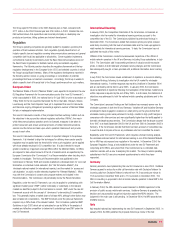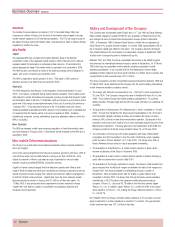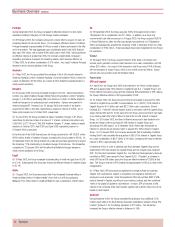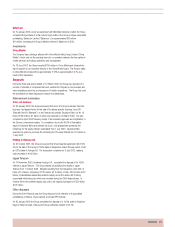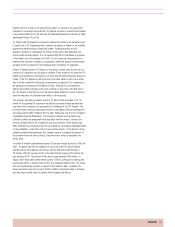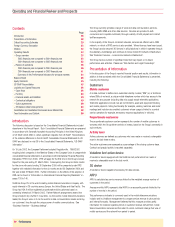Vodafone 2005 Annual Report Download - page 28
Download and view the complete annual report
Please find page 28 of the 2005 Vodafone annual report below. You can navigate through the pages in the report by either clicking on the pages listed below, or by using the keyword search tool below to find specific information within the annual report.
Risk Factors and Legal Proceedings continued
26 |Business
Please see “Business Overview – Licences and network infrastructure”for more
information on expenditures in connection with the acquisition of 3G licences and
expected expenditure in connection with the roll-out of 3G services. There can be no
assurance that the introduction of 3G services will proceed according to anticipated
schedules or that the level of demand for 3G services will justify the cost of setting up
and providing 3G services. Failure or a delay in the completion of networks and the
launch of new services, or increases in the associated costs, could have a material
adverse effect on the Group’s operations.
The Group may experience a decline in revenue per
customer notwithstanding its efforts to increase revenue
from the introduction of new services.
As part of its strategy to increase usage of its networks, the Group will continue to offer
new services to its existing customers, and seek to increase non-voice service revenue
as a percentage of total service revenue. However, the Group may not be able to
introduce commercially these new services, or may experience significant delays due to
problems such as the availability of new mobile handsets or higher than anticipated
prices of new handsets. In addition, even if these services are introduced in
accordance with expected time schedules, there is no assurance that revenue from
such services will increase ARPU.
The Group’s business and its ability to retain customers and
attract new customers may be impaired by actual or
perceived health risks associated with the transmission of
radiowaves from mobile telephones, transmitters and
associated equipment.
Concerns have been expressed in some countries where the Group operates that the
electromagnetic signals emitted by mobile telephone handsets and base stations may
pose health risks at exposure levels below existing guideline levels and may interfere
with the operation of electronic equipment. In addition, as described under “Legal
Proceedings”below, several mobile industry participants, including the Company and
Verizon Wireless, have had lawsuits filed against them alleging various health
consequences as a result of mobile phone usage, including brain cancer. While the
Company is not aware that such health risks have been substantiated, there can be no
assurance that the actual, or perceived, risks associated with radiowave transmission
will not impair its ability to retain customers and attract new customers, reduce mobile
telecommunications usage or result in further litigation. In such event, because of the
Group’s strategic focus on mobile telecommunications, its business and results of
operations may be more adversely affected than those of other companies in the
telecommunications sector.
Legal Proceedings
The Company and its subsidiaries are currently, and may be from time to time, involved
in a number of legal proceedings, including inquiries from or discussions with
governmental authorities, that are incidental to their operations. However, save as
disclosed below, the Company and its subsidiaries are not involved currently in any
legal or arbitration proceedings (including any governmental proceedings which are
pending or known to be contemplated) which are expected to have, or have had in the
twelve months preceding the date of this report, a significant effect on the financial
position or profitability of the Company and its subsidiaries.
The Company is a defendant in four actions in the United States alleging personal
injury, including brain cancer, from mobile phone use. In each case, various other
carriers and mobile phone manufacturers are also named as defendants. These
actions are at an early stage and no accurate quantification on any losses which may
arise out of the claims can therefore be made as at the date of this report. The
Company is not aware that the health risks alleged in such personal injury claims have
been substantiated and will be vigorously defending such claims.
Between 18 September and 29 November 2002, nine complaints were filed in the
United States District Court for the Southern District of New York against the Company
and Lord MacLaurin, the Chairman of the Company, and Sir Christopher Gent, Sir
Julian Horn-Smith and Mr. Kenneth Hydon, executive officers of the Company. The
actions were brought under Sections 10(b) and 20(a) of the Securities Exchange Act of
1934 and Rule 10b-5 promulgated thereunder by the Securities and Exchange
Commission. The complaints, which purport to be brought on behalf of all purchasers
of ADSs of Vodafone between 7 March 2001 and 28 May 2002, alleged that
Vodafone’s financial statements and certain Vodafone financial disclosures were
materially false and misleading. More specifically, the complaints alleged that, between
7 March 2001 and 28 May 2002, defendants made various material
misrepresentations relating to Vodafone’s investments in fixed-wire operations,
goodwill, and prior acquisitions in an effort to inflate artificially the price of Vodafone
securities. The complaints sought compensatory damages in an unspecified amount,
interest, reasonable costs including attorneys’ fees and experts’ fees, and equitable
and/or injunctive relief as permitted by law.
The plaintiffs filed a consolidated class action complaint on 6 June 2003. On
14 October 2003, the Court ordered that the complaint be dismissed, with leave for the
plaintiffs to re-plead. On 20 October 2003, the plaintiffs entered into a Stipulation
dismissing the complaint against Lord Ian MacLaurin without prejudice. On
10 November 2003 the plaintiffs filed a second consolidated amended class action
complaint against Vodafone, Sir Christopher Gent, Sir Julian Horn-Smith and Mr.
Kenneth Hydon. On 26 March 2004, the Court dismissed without prejudice the
remaining individual defendants from this action. On 7 May 2004, the plaintiffs filed a
third consolidated amended class action complaint naming only the Company as a
defendant. Thereafter, the parties entered into substantive discussions regarding the
possibility of settling the action. Those discussions led to a mediation, following which
the parties reached an agreement-in-principle to settle the claims against all
defendants in exchange for a settlement payment of $24.5 million to a settlement class
(the “Settlement Class”) comprised of all purchasers of Vodafone ADSs during the
period from 7 March 2001 to 28 May 2002 (other than those Class Members that
exclude themselves, or automatically are excluded, from the Class). Following the
mediation, Vodafone and its insurers paid $24.5 million into an escrow account to fund
the settlement in the event that (i) the parties reached a definitive settlement
agreement and (ii) that agreement received final approval by the Court after issuance of
the necessary notices and the conduct of the necessary hearings. On 4 March 2005,
the parties entered into definitive settlement documents and, on that date, participated
in a conference and hearing before the Court, at which they submitted a motion for
preliminary certification of the Settlement Class and preliminary approval of the
settlement. On 15 March 2005, the Court entered an Order that, among other things,
preliminarily certified the Settlement Class, preliminarily approved the settlement, set
23 May 2005 as the deadline for the submission by Class members of objections to
the settlement or requests for exclusion from the Settlement Class, and scheduled a
Settlement Fairness Hearing for 22 June 2005.
A subsidiary of the Company, Vodafone 2, is responding to an enquiry by the UK Inland
Revenue with regard to the UK tax treatment of its Luxembourg holding company,
Vodafone Investments Luxembourg SARL (“VIL”), under the Controlled Foreign
Companies section of the UK’s Income and Corporation Taxes Act 1988 (“the CFC
Regime”). The enquiry by the UK Inland Revenue relates to the tax treatment of profits
earned by the holding company for the accounting period ended 31 March 2001. The
CFC Regime serves to subject a UK resident company to corporation tax in the UK in
respect of the profits of a controlled foreign company in certain circumstances.
Vodafone 2’s position is that it is not liable to corporation tax in the UK under the CFC
Regime in respect of VIL on the basis that the CFC Regime is contrary to EU law. An
application for closure of the enquiry (inter alia) was made by Vodafone 2 to the Special
Commissioners of the UK Inland Revenue on 1 October 2004 on the basis that the
enquiry could not reasonably be continued as it is premised on UK legislation (the CFC



